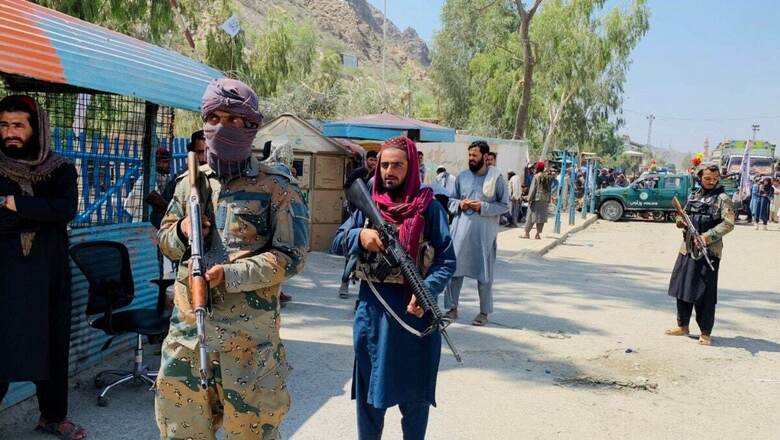
views
Afghanistan’s acting Refugee and Repatriation Minister Khalil-ur-Rehman Haqqani had revealed a startling detail in a documentary released on December 29, 2023. He had disclosed that the Pakistani army had facilitated the release of former Tehreek-e-Taliban Pakistan (TTP) leader Baitullah Mehsud and several other prominent terrorist leaders. This highlights the dual nature of Pakistan’s security establishment. While it claims to be facing the challenge of growing terrorism resulting in a significant increase in casualties, especially among security forces, it continues to facilitate the release of terrorist leaders.
In 2023, Pakistan witnessed a significant surge in terrorist activities, resulting in the highest number of casualties among security personnel during the last eight years. Islamabad found itself increasingly frustrated following the collapse of the government’s ceasefire with the TTP in November 2022. This brief truce was an ill-conceived effort by Pakistani authorities to end the 14-year-long conflict with the TTP. After the ceasefire failed, a wave of violence erupted, highlighted by the devastating TTP attack on a mosque within Peshawar’s police lines in January 2023, claiming nearly a hundred lives and sending shockwaves throughout the country.
The revival of TTP underscores the group’s capacity to adjust and reaffirm its influence in Pakistan. The brazenness and high frequency of these attacks suggest a carefully orchestrated strategy, testing the efficacy of Pakistan’s counter-terrorism efforts. The rise in terrorist attacks has not only stretched Pakistan’s security mechanism but has also heightened public anxiety. Amidst an atmosphere of uncertainty, the government’s task of preserving stability in Pakistan has become more complex and challenging.
The TTP has adopted a new strategy characterised by centralized command but decentralised operations. This objective is to create confusion, protect its operatives, and garner political support for terror activities. Despite estimates from the US Department of Defense and a UN report suggesting that the TTP has between three to six thousand fighters in Afghanistan, the dispersion of TTP cells in Pakistani urban centres obscures their actual strength. According to its annual report for the previous year, the Tehreek-e-Taliban Pakistan (TTP) claimed responsibility for 881 attacks across Pakistan, resulting in the deaths of over 2,193 Pakistani soldiers.
The TTP’s decentralised operations model allows them to remain evasive and unpredictable posing a major challenge for Pakistani security forces. This approach not only helps them avoid large-scale confrontations but also facilitates effective guerrilla warfare. Moving away from territorial control to a fluid, cell-based operational approach has made it challenging for the Pakistani military to locate and neutralise TTP members. This shift in tactics reflects the TTP’s adaptability and their grasp of evolving security dynamics.
On July 14, 2023, the Inter-Services Public Relations (ISPR), the media arm of the Pakistan army, issued a strong statement expressing concerns over the safe havens and operational freedom enjoyed by the TTP in Afghanistan. This statement followed a series of deadly incidents, including a TTP assault on a military base in Zhob district on July 12, 2023, resulting in the deaths of nine soldiers. Despite Pakistan’s efforts to conduct intelligence-driven operations against terrorists, there has been no significant improvement in the security situation with TTP attacks on Pakistani security forces continuing without pause.
The ongoing assaults have revealed weaknesses in Pakistan’s security framework and placed significant strain on the military. The ISPR’s statement underscores the military’s frustration and the formidable challenges it faces in countering TTP activities. The failure to find a lasting resolution has not only dampened the military’s morale but also shaken public trust in the government’s ability to ensure the safety of citizens. The persistent nature of these attacks demonstrates the TTP’s operational effectiveness and their ability to sustain a protracted insurgency.
In response to the escalating terrorism threat, Pakistan’s Prime Minister authorised the commencement of Operation Azam-e-Istehkam on June 22, 2024. This nationwide counter-terrorism campaign involves all stakeholders and covers even Gilgit-Baltistan, and Pakistan Occupied Jammu-Kashmir (PoJK). This operation follows a previous initiative launched by the PDM government in April 2023, which did not achieve the expected outcome.
The situation in 2024 differs greatly from that of 2008 when TTP was targeted for the first time by conducting extensive military operations against it. At that time, the TTP held substantial territory. Pakistan’s security forces had conducted operations to dislodge militants and restore state control. However, the TTP no longer maintains territorial control to the same extent and its fighters are now dispersed across the Pak-Afghan border regions. This reduces the feasibility of large-scale military actions. The financial constraints faced by the Pakistani government have also restricted support for such expansive military campaigns.
It is clear that the dispersed TTP fighters and Pakistan’s economic challenges have greatly limited the military’s capacity for large-scale operations. Unlike previous campaigns targeting TTP strongholds, the current situation demands a more intricate and strategic approach. The emphasis now lies on intelligence-driven operations aimed at dismantling the TTP’s decentralised networks. However, the effectiveness of these operations is limited due to resource constraints and the challenging terrain of the border regions.
Public backing for military campaigns against the TTP has also diminished remarkably. The previous operations against it had led to extensive displacement. A large number of displaced people had to move to refugee camps with no facilities. There was widespread destruction of homes and loss of livelihoods. This had left the Pakhtun community incensed. Protests across regions like Swat, directed against both the TTP and military interventions, underscore this sentiment. The emergence of the Pashtun Tahafuz Movement (PTM), which critiques military strategies and highlights Pakhtun hardships, has further complicated efforts to garner public endorsement for state-led military efforts.
The present security landscape in Pakistan is characterised by a convergence of obstacles that have derailed its counter-terrorism operations. The decentralised structure of TTP activities, the government’s financial limitations, and insufficient public backing for military measures collectively contribute to a fragile scenario.
The writer is an author and columnist and has written several books. His X handle is @ArunAnandLive. Views expressed in the above piece are personal and solely those of the author. They do not necessarily reflect News18’s views.



















Comments
0 comment